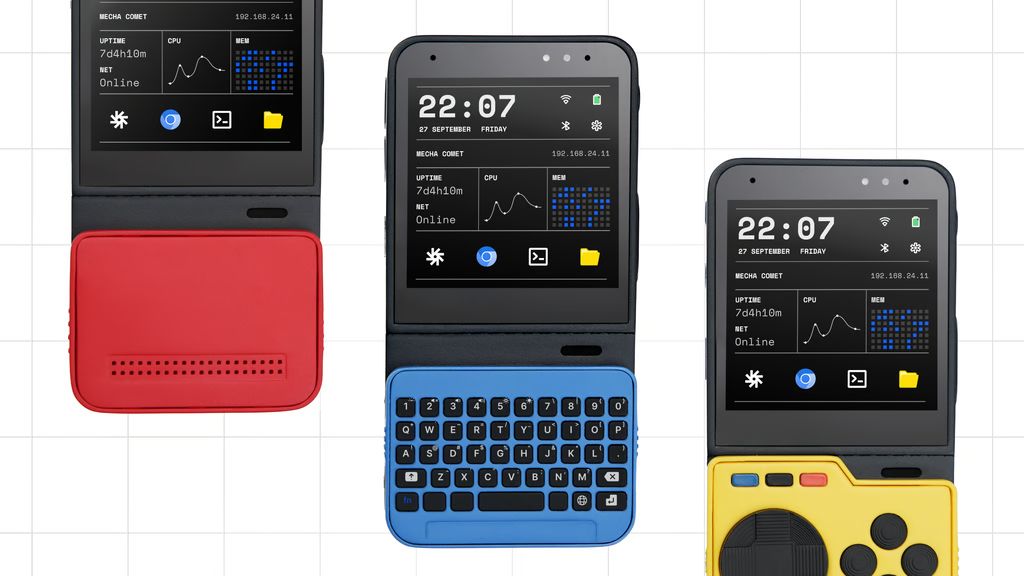- cross-posted to:
- [email protected]
- cross-posted to:
- [email protected]
What I like about this is that I could theorhetically install a non-QWERTY keyboard instead of being locked to such an inefficient layout. Yes, eventually you can learn to touch type, but learning it would be nice to have the keys since it will be a nonstandard layout at that size & when you hand it off to other folks, it’d be completely unexpected to hit
q& get a'.I would really love a return to a concept where you have a tablet that docks into a full size laptop form factor. Even better if the dock can have a graphics card.
Agree. Sometimes I want a tablet, sometimes a laptop but I don’t need or want 2 separate devices of that size. I recall quite a few Android projects (Mirabook, Project Linda) that would use a phone with a laptop dock but I’d prefer a phone as a standalone device and a secondary, larger & more powerful, device that can have multiple forms.
yeah I also don’t want android.
Was just using that as an example. It would be great to see a Linux device with this capability. I have played around with a few Linux phones and convergence was a feature that received attention so I think there’s hope.
really feel framework is perfect for this. Make the screen a tablet. Have the additional graphics and hard drive on the base. Actually the microsoft surface book was basically what I want but with a company that sells it with linux and supports it with their company distro.
Microsoft still make the surface pro
I wonder who this is made for?
The article calls it a “smartphone sized pocket computer”, but that describes smartphones too; they already are pocket computers. And they’ve had decades of design and development behind them.
So… This device has a tiny touchscreen, and a keyboard, rather than having the whole thing being a touchscreen. So instead it has a modular bottom half… Which… Sounds like it’s trying to solve a problem that would’ve been a problem in like… The 90s, maybe, but has been solved by using… A touchscreen that can change the type of input it is flexibly, like smartphones do.
It can’t call, like a smartphone, despite being a smartphone sized device. It has USB A 2.0 sockets and an Ethernet socket… Which makes it once again sound incredibly out-dated, like a device found in a time capsule, because USB C is smaller and faster than USB A 2.0, and can potentially be used for damn near anything. Which includes connecting to the Internet.
Its battery looks very weak. Its CPU looks very weak. It has a tiny amount of RAM, and a tiny amount of storage. It is outclassed by any affordable, midrange smartphone, at nearly the same price too (if you avoid big brand names).
This device has a tiny touchscreen, and a keyboard, rather than having the whole thing being a touchscreen.
That’s awesome. I still miss my Blackberry Passport (keyboard and large 1:1 screen).
Tiny keyboards were a nightmare. There’s a reason why the Blackberry failed. You might like it, but then you’re part of a minority.
Wide display: perfect for reading A4 documents
keyboard: nicer to type. Also, the passport was as wide as, well … , a passport so it is a pretty decently sized keyboard which isn’t comparable to the tiny Q10.
The passport was never meant to be a generic for the masses device. It is a beautiful specialized tool.
And they didn’t fail because of their keyboard…
Yeah they did. It was a pretty major factor. The moment touchscreen phones began to exist, Blackberry became past-tense.
It was them sticking with proprietary software instead of going with Android. I’m sticking to those guns.
I’d say their software limitations are the reason they failed, not the keyboard. In fact, people really liked the final BlackBerry devices with Android and a keyboard, but at that point the company was already gone.
But while iPhones were at the boom of Fruit Ninja, Angry Birds, iBeer and using Skype, and Google’s Android looked like ass but already had ad-infested versions of the same titles, BlackBerry had… corporate messaging? A really robust email app, I guess?
For people who like a concept more than practicality. There’s maybe a handful use cases that this specific device fits in that isn’t covered better by existing tech, but I guarantee if that thing actually gets kickstarted and arrives severely delayed in several years, it’ll show up in a couple YouTube videos with people sort of uncertain what to use it for, and in the vast majority of cases it’ll end up in some drawers after having been used a few hours tops.
My thoughts exactly. I’ve seen several such devices already, probably the most expensive and over-designed one being the Apple VR, and it’s always the same story.
Full-size usb, Ethernet and keyboard mean you can use it as a Linux computer, install arbitrary debian packages, run shell scripts, python scripts, and you don’t need any dongles. This is the differential factor. You can’t do the same on a smartphone, and it’s not supposed to be a smartphone. Why would you need a separate sim card when you can simply tether Internet from your phone?
I get that this device isn’t for you, but there are people who don’t want to write and maintain apps through apps stores and simply want to copy simple scripts into a small device they can have with them. It’s a niche market and good for them for trying to fill that niche.
I wonder what they use for charging port if not usb c…
You can do all that with USB C and a touch keyboard. There is no good reason under the sun to make a device that is this dated in concept.
Whatever the market is they’re trying to fill, it’ll be so extremely niche that this product is already a failure. It’s not the first time some kind of ultra niche product from kickstarter failed before launch because except for a small handful even cared.
How do you install utilities like
kubectland azure CLI on Android?If you get a phone and install PostmarketOS on it, you could also get pretty far on it, couldn’t you?
I can do that and more on my Pinephone running Kali Nethunter. While it’s mostly a gimmick with awfull battery life, I’ve already used it a few times mostly in regards to wifi pentesting for my cyber-sec job, i.e when going to lunch onsite and you notice a new wifi AP you didn’t see when inside the office you’re working on.
And since it has an USB-C, I can simply plug in a dock with two USB-As, Ethernet, PD and HDMI, to turn it into a full-fledged Kali desktop.
Pinephone looks great and the keyboard case seems very ergonomic. Fo you use it as your daily driver?
I tried it like a year ago, maybe more, and it wasn’t ready for that. The battery life was awfull (which was a SW issue of the OS not being able to stand-by properly), and accepting calls wasn’t really reliable. It’s more of a gimmick and great as a side-phone, but I wouldn’t use it as a daily driver.
But the situation might’ve changed.
Well that looks cool. I just hope I would have use for such device.
I wonder how they plan to keep updating this Mechanix OS after initial sales slow down
It’s going to be just like my pocket chip and die quickly after in terms of software support. Where I had to run my own hacks and also run archive debian repositories for the hardware itself only for the flash to die a year afterwards. I can say though it was the coolest device I had and hacking it was really neat especially with the UI and scaling apps on the device.
Gross. Why would they launch on a scam platform like kickstarter?
Let me know if they launch on crowdsupply
this would have been really cool 15 years ago
Funny story. LG made something with a similar concept about 10 years ago and it never really took off. The LG G5 was a modular smart phone that was supposed to have a bunch of cool modules, but they never came to fruition.
I had one, but mostly because I loved having a swappable battery. Never had to charge my phone, I would just have a spare battery charging on my desk and I would swap it out before I left the house.
Motorola had a similar phone. It was cool at the time, but just never took off. It was the Moto Z series.
Jolla had similar concept too at 2013. I had one and back then it was really, really nice phone. Maybe not in a sense that flagship models from big vendors were, but I really enjoyed the UI and modular options was a huge selling point at least for myself. Then they started to work with a tablet which failed on pretty much all fronts and the whole company practically disappeared.
My interest is piqued, but it doesn’t have a native usb-c? Only old usb-a? Am I reading that right? The c is a part of one of the attachments? Don’t love that.
I see a lot of negativity in the comments. And yeah, this thing probably isn’t something I’m going to get, but at least they are trying something that isn’t a generic rectangle of glass like all the others. I miss the days of fun gadgets.
Fun useful gadgets. A gadget for the sake of a gadget is just another word for “e-waste”.
Yeah I’m just tired of seeing projects like this get abandoned quickly
I get it, but a gentle reminder, often the best way for society to have an awesome projects is to have a lot of projects.
Fair point
I like the generic rectangle block of glass.
Don’t understand why they insist on a physical keyboard.I much prefer physical keyboards and find it difficult to use touchscreen, so a mobile, qwerty keyboard sounds great to me.
What phones u guys been using for the last 15 years? I haven’t seen slide out keyboards for about that long
Nokia 105, Wish it had qwerty though.
I don’t mind it, but I also don’t hate that people are trying something new! Maybe it fails, but maybe it’s awesome!
i am personally sick of shiny rectangles. physical keyboards are the buttons on your cars dash instead of the shiny rectangle on your car’s dash.
Cars’ buttons need to be used while preferably not looking at them, that’s a pretty different situation to a smartphone
Also, I can somewhat type eyes-free on a smartphone keyboard because of the combination of autocorrect and my fingers remembering where the touch points are relative to the screen
Being able to use a keyboard without looking at it is a good thing.
Only thing that makes it “different situation” for smartphone is that they just don’t have the keyboards. (And some of us kinda accepted that…)
Interesting I just saw another handheld Linux device on YouTube earlier today that is launching soon. Namely the Pilet. I’m kinda interested in something like this. Though I’m not sure for what.
Looks nice and I’d like it even more, had it an USB-C port with display output.
But even in the current configuration it’s a nice gadget at a reasonable price point.
4 GB RAM is not exactly great for a kind of desktop computer (even with Linux), but using this thing as a server with a built-in keyboard and display would have saved me some trouble I faced with unresponsive RaspberryPis.yet an other hardware from 10+ years ago. here we have an ARM Cortex-A53 from what it seems to be 2012. Maybe it is actually compatible with OpenGL 3…
Our beloved consoles from the 80s and 90s were built with off the shelf parts, this is no different. Custom hardware in a niche market would lead nowhere.
this comparison is really bad. consoles built with 6502s could get away with it, since everything they ran were games crafted in assembly to fit the timings to the last clock cycle. this product is supposed to run modern graphical software.
I would pay more than 1000$ at this point for a modern high DPI open device with mobile internet compatibility and all drivers in mainline kernel. Just give me good hardware, I can handle the software on my on, tank you 🤭
If you want all drivers in the mainline kernel, you clearly cannot handle the software on your own. The reason why linux phones suck are the drivers that are either bad or don’t exist. The desktop (or palmtop I guess) environments are pretty usable if you run it on something with good drivers (like QEMU - my favorite phone).
Yea, I did not phrase it well enough 😂 I just don’t want to be supervised by these large phone OS giants, because they think it is more convenient
What do you mean with QEMU? Are you running a Linux VM on your android phone?
It was a joke about the fact that PostmarketOS considers only QEMU a “main” device. Every real phone is in the “community” section because they’re too buggy. So the only good device to run that OS on is a virtual one running inside your desktop.
😆I see
I think I would run Arch on such a device
I’m intrigued. And although I read the article, I’m not entirely sure who or what this is for. It’s cool, but… what?
I feel like this would fit in some unexpected areas of mobile computing. Music, interfacing with other equipment (e.g. industrial computing), or other places where people might normally take a full laptop where that’s kind of overkill.
I’m not really sure, and I kind of wish I had a need for one.
I think it’s for the Hacker News crowd that’s always clamoring for smaller phones, or phones with a physical keyboard. Potentially for parents to give to their young children, to be able to contact them without getting them addicted to screens right away.
Not sure how big those markets are though.
I feel like if the people who make raspberry pis made a phone (or phone components, mainly the board) I would buy the hell outta that bitch. This sounds kiiinda like that but idk that I actually trust it.
I’m thinking about crafting a phone out if a raspberry compute module (so I can upgrade my device easy with new computing modules released)
I want to add a battery, a modem, a touchscreen and a usb-PD port with video out compatibility
Maybe a little cam to scan documents as well…
What would you do for a sim card? Other than that I’m loving this train of thought
Something like this, I guess
https://www.jeffgeerling.com/blog/2022/using-4g-lte-wireless-modems-on-raspberry-pi
Pretty neat, but probably not something I’d buy
I keep saying the same about the iPhone but they keep making new ones
A little worried that with swapping those components like that, it’s trying to be too many things for too many different groups of people instead of one exact thing.
I think all I really want is something shaped like this with a keyboard, like an old Blackberry that could be used as a terminal.
like the unihertz titan slim?
Very odd specs page: “256GB memory”, “Face ID”, “Advanced GPS”, etc, To me this does not look trustworthy at all.
its a standard android phone its marketed toward blackberry users who had no choice but to abandon the key2 as it just got too old to be in any way secure
I agree that id like a nice handheld terminal, but dont a lot of people like handheld emulation consoles? Hell both of those sound great to me. I would totally get both the game pad and keyboard if i went for it.
My real concern is that it would be garbage and/or the company would fold and support would become non existent.
Maybe i just got burned by pocketchip
Still have my Pocket CHIP. I look at it sometimes and sigh, thinking about what could have been.
There are a couple resources around to bring it up to something approaching working on the internet, but not much, and not complete, last I checked.
Thing was great for playing terminal roguelikes, though.
Yep its one of the bigger issues. I wanted to get a uconsole, but ive heard the support is not the greatest. And the wait times are horrendous for the hardware.
A little worried that with swapping those components like that, it’s trying to be too many things for too many different groups of people instead of one exact thing.
Isn’t that exactly what made Raspberry Pis a massive hit? Being able to be so many different things for so many different groups of people, at a reasonable price point, maximizing the groups it appealed to?
Yeah, but raspberry handhelds are chonky at best.
Right, which is why I’m implying this could be a hit because it’s the right form factor aimed at a myriad of use-cases.
😏I see what you did there, myriad is awesome


















